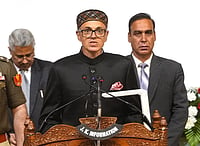Actor Raqesh Bapat has always championed the cause for switching to a sustainable lifestyle. One of the pioneers in Mumbai who began sculpting his own Ganpati Idol from natural clay and passed the baton to other actors, Bapat's passion to teach his art has reached new heights, as he prepares DIY kits for people to sculpt their idols this Ganpati.
Raqesh Bapat: We Do Not Inherit The Earth From Our Ancestors, We Borrow It From Our Children
Actor Raqesh Bapat opens up about how every person can become sustainable and try to help conserve nature. He also talks of his initiative of sculpting his own Ganpati idol from natural clay – an activity that he has not only been doing himself, but also teaching other actor friends of his.

Sharing a poignant thought-provoking message, Bapat shares, “I'd heard this quote that stuck with me ever since I read it, 'We do not inherit the earth from our ancestors, we borrow it from our children’ and rightly so. I think any form of art is merely a God gift and it is my responsibility to share my gift with those close to me and really interested. Not that I talk enough about it, but back at home, we have led or rather tried to lead a sustainable life as much as possible. When I started sculpting, it evoked a sense of calm & happiness, it felt like I was being kinder to our planet. It felt therapeutic.”
“As time passed, I'd a calling of sorts and I had this urge to take this creativity a notch higher and also include other people in the process. I've taught Karan Wahi, Rithvik Dhanjani, Tejasswi Prakash and some other friends. We've spent hours in silence which almost felt like a happy trance as we brought the murtis to life. I feel like a proud teacher when I see some of them continue it year after year. This is not some gimmick. This is a way of life. We have to start somewhere for our children, our future generations,” adds Bapat.
“On social media, I see a lot of talks surrounding the environment and many campaigns led by companies but sustainability has to be a lifestyle. How many of us actually follow that on a daily basis? All I'm saying is we have to start somewhere and charity begins at home. It's about time we speak less and do more because the things of nature do not belong to us, we should leave them to our children as we have received them,” concludes Bapat.
- Previous StoryOccupied City Review: Steve McQueen’s Holocaust Documentary Wearily Cuts Between Past and Present-Day Amsterdam
- Next Story























